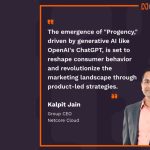This commentary was contributed by Richard Jacobson, Marketing, Communications & CSR Leader, IBM ASEAN
With unprecedented speed, generative artificial intelligence (AI) has morphed from a media buzzword into a boardroom imperative. The 2024 IBM CEO Study found that close to half (46%) of all ASEAN CEOs surveyed say that their organisations are now investing in piloting and experimenting with generative AI across various functions.
In marketing, generative AI fuels both high-octane content creation processes and real-time data analysis, giving marketing teams the ‘nitro boost’ needed to deliver bespoke customer communications efficiently.
According to The CEO’s Guide to Marketing Report, 76% of chief marketing officers (CMOs) believe that generative AI will revolutionise marketing operations, while an equal percentage fear that failure to adopt it swiftly will result in a competitive disadvantage.
While many chief marketing officers (CMOs) are still in the planning stage, the effective deployment of generative AI in marketing is already yielding promising results.
I am pleased to share that IBM is at the forefront of this marketing transformation journey, partnering with Adobe to streamline its marketing operations across the board. By integrating Adobe Workfront – a central piece in the Adobe suite – IBM has successfully optimised its marketing workflow by seamlessly connecting disparate teams and stakeholders.
This integration not only enhances efficiency but also accelerates content delivery, reduces costs, and boosts productivity, enabling IBM to deliver data-driven, highly relevant client experiences faster than ever before.
Marketing as the Pacesetter for Enterprise-Wide AI Adoption
Generative AI’s influence, indeed, extends beyond marketing, setting the pace for enterprise-wide transformation. Despite the significant advancements in generative AI, only 26% of CMOs report implementing it collaboratively across marketing, sales, and customer service.
This low adoption rate represents a glaring missed opportunity, underscoring a failure to fully harness AI’s potential. The lack of integrated efforts not only squanders resources but also hinders the creation of seamless customer experiences, critical for driving sustained business growth.
Such fragmentation can prevent businesses from keeping pace with competitors who are more effectively leveraging AI to unify their customer engagement strategies.
With content demands growing exponentially, organisations are increasingly pressed to create more content efficiently to meet timely, personalised experiences. Generative AI significantly boosts this efficiency in marketing by optimising content creation processes and enhancing data analysis capabilities.
According to an IBM Institute for Business Value (IBV) report, nearly all CMOs (94%) anticipate that generative AI will liberate marketing teams from mundane tasks, empowering them to focus on more important, creative activities.
In a similar vein, almost two-thirds (63%) strongly agree that generative AI would substantially scale the delivery of personalised content not by creating it, but by making the creation process more efficient.
IBM’s partnership with Adobe exemplifies how AI can streamline marketing operations across extensive networks of marketers, products, and geographies. The integration of Adobe Workfront and other Adobe tools has enabled IBM to consolidate data and consolidate structures efficiently.
For example, the initial phase led to $300 million in cost savings, a 50% reduction in labour costs, and a 75% faster time to market. Subsequent phases have focused on integrating AI and automation technologies, such as Adobe Firefly, to further enhance efficiency, leading to dramatic increases in engagement and reductions in costs.
These efforts have successfully accelerated content delivery while improving the quality and relevance of marketing outputs, demonstrating AI’s role in enhancing productivity rather than just content generation.
This transformation within IBM illustrates how breaking down operational silos can catalyse necessary shifts in organisational culture, with the adoption of AI driving substantial improvements in marketing efficiency and enabling marketers to focus on higher-value tasks.
IBM and WPP have also announced a collaboration to reinvent how B2B marketers identify and engage clients and prospects across the buying journey.
WPP Open for B2B, powered by IBM’s watsonx, will help marketers solve complex B2B marketing challenges, accurately identify and engage buying groups, and improve clients’ return on investment.
WPP and IBM will strategically collaborate with LinkedIn to help brands better understand buying groups so they can market more effectively and reach target buyers. IBM has been the first user leveraging the platform to accelerate its AI-driven marketing and communications transformation.
Long and short of it all, and to re-emphasise again, Gen AI enhances the efficiency of overall marketing processes by automating repetitive tasks, providing valuable insights, and improving the quality and relevance of the final output.
Real-Time Insights and Agile Marketing Strategies
Companies have long had the data they need to create hyper-personalised experiences. But it’s been housed in disparate data sets across multiple departments, and marketing didn’t have the power to harness it—until now.
Generative AI’s real-time insights enable marketers to gauge the effectiveness of their personalised products, services, and experiences quickly. This agility allows them to pivot strategies when necessary, ensuring that marketing efforts remain aligned with customer preferences and market trends. The ability to respond swiftly to changing conditions is a critical advantage in today’s fast-paced business environment.
Strategic Actions for CEOs
To fully leverage the benefits of generative AI in marketing, CEOs must take strategic actions that align with the insights provided by IBM Institute for Business Value (IBV) report. Here are three key actions that IBM recommends for:
- Position Marketing as the Model for Generative AI-Driven Transformation: Marketing should lead the way in adopting generative AI, serving as a blueprint for other departments. By demonstrating the successful integration of AI, marketing can help drive broader enterprise-wide adoption.
- Prioritise Creative Ideation and High Production Value in Marketing Content: While AI can handle data analysis and automation, the creative aspect of marketing remains a human strength. CEOs should encourage their teams to focus on creative ideation and producing high-quality content that resonates with their audience.
- Build 360-degree Customer Profiles Using Integrated Data: Integrating data from various sources to create comprehensive customer profiles is crucial for delivering personalised experiences. This holistic view of the customer journey allows for more targeted and effective marketing strategies.
Navigating the Risks and Challenges
While generative AI offers significant benefits, it also introduces new risks and challenges. Data privacy and governance are critical concerns, as the misuse of customer data can lead to a loss of trust and potential legal repercussions. Marketing leaders must adopt robust data privacy practices and ensure compliance with relevant regulations to safeguard customer information.
Additionally, the integration of generative AI requires a cultural shift within the organisation. Employees must be trained to work alongside AI, leveraging its capabilities while maintaining a focus on strategic and creative tasks. This shift involves redefining roles and responsibilities, fostering a collaborative environment where human and AI capabilities complement each other.
This commentary was contributed by Richard Jacobson, Marketing, Communications & CSR Leader, IBM ASEAN.
MARKETING Magazine is not responsible for the content of external sites.









